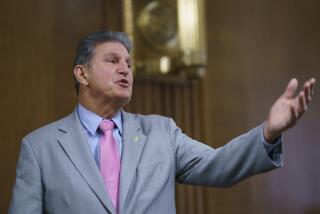Darman Hits ‘Wonderland Politics’ of Deficit : Budget Nominee Says He Wants to End ‘Game’ Where ‘Cuts Are Increases’
- Share via
WASHINGTON — Richard G. Darman, nominated as George Bush’s budget director, told Congress today that he hopes to replace the “wonderland politics” that brought about huge federal budget deficits with realistic deficit reductions.
Darman, in prepared testimony for his Senate confirmation hearing, said it was essential that the federal deficit be reduced.
“We must end the game of wonderland politics where cuts are increases and going down means going up,” Darman said.
Under questioning by the Senate Governmental Affairs Committee, Darman said the President-elect does not plan to weasel out of his pledge not to raise taxes by calling a tax increase something else.
He said he expects Bush will abide by the “duck test”--if it looks like a tax increase, it is a tax increase.
Bush “meant ‘no new taxes’ as it would ordinarily be understood by ordinary Americans and the duck test should be applied,” Darman said. “If ordinary people think it is a tax increase, it is a tax increase.”
He specifically included in Bush’s “read-my-lips” pledge against tax increases a boost in the gasoline tax, higher levies on alcohol and tobacco, removal of home mortgage interest deductions and taxation of currently exempt employee fringe benefits like health insurance.
Concerned that Darman was opening the door to tax increases by some written answers to advance questions, several members of the committee questioned him about possible new taxes.
In his written responses Darman had said that under some circumstances a boost in taxes on gasoline, cigarettes and liquor could be viewed as “user fees.” He had also suggested that higher taxes on Social Security benefits might be described as a “benefit reduction.”
Serious Calamity
During the questioning today, Darman said that a serious economic calamity caused by the huge budget deficits might force him to recommend that Bush violate his pledge.
But he emphasized that he did not foresee such a recommendation, in large part because it is important that a new President not lose his credibility by reneging on a campaign promise.
Asked how many years Bush’s no-tax pledge was good for, Darman replied, “We might as well assume forever--certainly for some extended period of time.”
Darman, the point man in Bush’s battle to reduce the deficit, was widely praised by committee members for his government skills and is expected to win confirmation easily as director of the Office of Management and Budget.
Darman is in many ways similar to David Stockman, President Reagan’s first budget director. Both men have been described as brilliant political strategists, but they have also been accused by critics of being abrasive and intellectually arrogant.
Darman’s role as head of management and budget will put him more in the spotlight than he was during the Reagan years, when he served as one of the Administration’s top behind-the-scenes strategists, first as a top White House aide and then as deputy Treasury secretary. In both posts, he worked closely with James A. Baker III, nominated by Bush to be secretary of state.
Darman resigned from the No. 2 job at Treasury in April, 1987, to take a job with the investment banking division of Shearson Lehman Bros. He was lured back into politics last year when he joined the Bush campaign.
More to Read
Get the L.A. Times Politics newsletter
Deeply reported insights into legislation, politics and policy from Sacramento, Washington and beyond. In your inbox twice per week.
You may occasionally receive promotional content from the Los Angeles Times.







